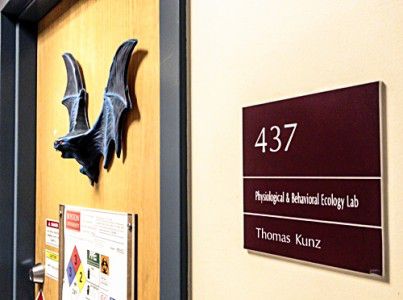
Kate Langwig, a doctoral candidate in the Graduate School of Arts and Science, said life in the Kunz Bat Lab at Boston University has been very different since its namesake, Thomas Kunz, stopped researching there.
“There has been incredible outreach for all of [his lab members], and we are very appreciative of all the support we’ve received during this difficult time,”Langwig said.
Kunz, a biology professor, director of the Center for Ecology and Conservation Biology and world-renowned expert on bats, suffered severe brain injuries after a car accident on Oct. 26.
Since surgery to relieve brain swelling, Kunz has been recovering slowly while seeing speech, physical and occupational therapists, according to a blog updated by his wife Margaret.
Elizabeth Braun de Torrez, another PhD candidate working in the Bat Lab, said Kunz had an infectious presence in the lab and biology department.
“His enthusiasm for new projects, passion for bat conservation and his curiosity for the natural world was extremely contagious,” Braun de Torrez said. “When he was out in the field trapping bats or working with students, his energy seemed limitless, and it was clear that he was doing what he loved.”
Langwin said the BU biology department and faculty from other institutions have offered to advise researchers in Kunz’s absence. Graduate students working in the lab continue to work on research started before the accident.
“Since Tom’s accident, the dynamic of the lab has certainly changed, and I believe that we all miss his energy and drive,” Braun de Torrez said. “However, with the incredible support of the biology department . . . we are continuing on with our research projects.”
Kunz has been a faculty member at BU since 1971, has co-authored more than 240 publiations and was the editor of Ecology of Bats and Ecological and Behavioral Methods for the Study of Bats, peer-reviewed journals within his field, according to his biography on the lab’s website.
Prior to his accident, Kunz was researching the ecological and economic effects of bats, the impacts of wind-energy development on bats and the effects of white-nose syndrome, a disease that has negatively affected the bat population, on hibernating bats, colleagues said.
Nate Fuller, another PhD candidate working in the Bat Lab, said he and the other graduate students hope to maintain Kunz’s energy, enthusiasm and vision in the lab.
“It has been difficult to suddenly be without my mentor and friend,” he said, “but Tom taught me a lot during the past three years and I’ve used the lessons I’ve learned from his experience to keep my research moving forward.”



















































































































Janice Edgerly-Rooks • May 9, 2013 at 5:07 pm
My husband and I spent time with Tom in Trinidad and my husband painted a gorgeous painting for Tom as well as drew a number of illustrations of tent-making bats for Tom. Can we have his address to send him a card?
We were so saddened to learn of his accident. He is a delightful and inspiring person. I was so pleased to read this article that was written in his honor as well as to learn more information about his team of researchers still working in his lab (just discovered your article today).